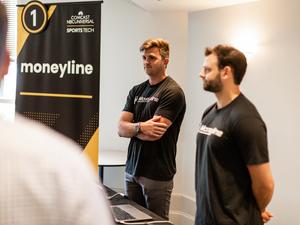
An Atlanta technology company that symbolized the city's startup boom is laying off employees, another sign of investors pulling back after a record year.
Atlanta Inno was first made aware of the development by various LinkedIn posts.
Sonar Software Inc. alerted staff of the layoffs on May 23, according to three current and former employees who spoke to Atlanta Inno. The employees asked to remain anonymous. When reached for comment, a Sonar spokesperson replied she was “curious" to learn how Atlanta Inno intended to use the information. The spokesperson didn't respond to any additional requests for comment.
According to one former employee that was impacted, approximately 40% of the company’s staff was laid-off.
Sonar executives planned to grow its team from 25 employees in March 2021 to 75 employees by the start of 2022 following a $12 million investment round, according to previous Atlanta Inno reporting. It is unclear whether Sonar reached that goal before the layoffs. It is also unclear how many employees the startup currently has.
That March 2021 investment round, which brought its total funds to $15.7 million, was led by San Francisco’s Craft Ventures with participation from Slack, Valor EP, Parade VC and SalesLoft CEO Kyle Porter.
Sonar's growth came amid a record of year of funding for startups in Atlanta — over $4 billion poured into the ecosystem.
Now, during a time of geopolitical turmoil and rising inflation, investors are pulling back, leaving some startups running out of cash at a rapid pace. That could cause layoffs, pause innovation and postpone acquisitions.
David Sacks, co-founder of Sonar's lead investor Craft Ventures, advised some portfolio companies to make cuts if they are in “danger zone" — his wording for burning through cash too quickly or seeing margins get too thin.
“Giving yourself time to address the issues in your business is the most important thing you can do right now to make sure you survive,” Sacks said on the call last month. “Don’t wait to take the hard steps, because the sooner you rationalize your burn, the more money you have in the bank on the other side of that decision.”
He went on to say that “If I were under two years of runway and had a burn multiple above two, I would personally be making cuts right away. At a minimum, I’d be freezing spending to grow into a burn rate that was more reasonable.”
Founded in 2018, Sonar's revenue has grown 9,698% between 2019 and 2021, landing it as the No. 8 fastest-growing company in metro Atlanta. During the same time frame, its employee count increased by over 2,500%.
Last year, Sonar seemed to have all the makings of a young startup on a steep growth trajectory. In addition to raising an investment round, the company was featured in the Technology Association of Georgia’s Top 40 Innovative Companies. Its customers included Atlanta companies Terminus, FullStory and CallRail.
Sonar helps companies manage their tech stacks by giving product developers a blueprint for how software changes may affect other aspects of the company, such as sales and marketing teams. Sonar CEO Brad Smith attributed much of the company's early success to companies' needs for more collaboration tools as their teams went remote.
Sonar's job cuts come around the same time that marketing technology startup Terminus, once considered a potential unicorn, also laid off some of its staff. Those layoffs also came about a year after an investment round.
These layoffs could indicate a larger trend that may befall more Atlanta startups. Last year, company valuations skyrocketed because of pent-up investor demand. Some valuations grew to three to five times more than what they would have been previously. That year, five local startups reached $1 billion valuations.
But in recent months, company valuations have been reset, going down anywhere from 40% to 70%. Companies don't tend to seek outside capital if their valuations decrease from when they previously raised money. Reports of tech startups cutting back costs and laying off employees are happening around the country.
Generally, a company struggling to raise its valuation could choose to restructure its business to focus on its most profitable products and cut costs where departments aren't performing as well.







